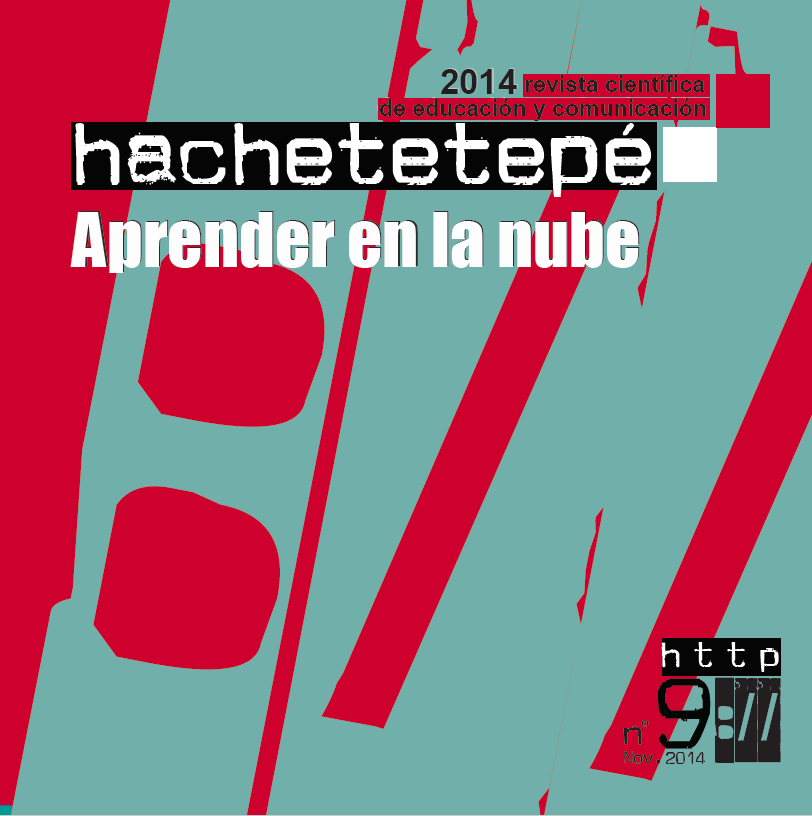The MOOCs, evaluation of a model of learning in the cloud

Info
Abstract
MOCCs are a new way of learning in the cloud computing, so this paper will focus on the analysis and evaluation of 26 MOOCs platform courses, both national and international, to know whether they are achieving the quality criteria and to know what shortcomings must be resolved. So the educational characteristics of MOOCs will be determined by evaluating the courses and establishing relationships between them. All of this is analyzed to give an answer to the working hypothesis of the research about the existence of differences between the platforms that offer MOOCs in Spanish with those that offer MOOCs in English, but the results have not supported this hypothesis.
Keywords
Downloads
How to Cite
License

This work is licensed under a Creative Commons Attribution-NonCommercial-NoDerivatives 4.0 International License.
Those authors who have published with this journal, accept the following terms:
- They will retain their copyright and guarantee the journal the right to first publication of their work, which will simultaneously be subject to the Creative Commons Attribution License . They may be copied, used, disseminated, transmitted and publicly displayed, provided that the authorship, url, and magazine are cited, and are not used for commercial purposes. No derivative works are allowed.
- They may adopt other non-exclusive license agreements for the distribution of the published version of the work (e.g., deposit it in an institutional telematic archive or publish it in a monographic volume) provided that the initial publication in this journal is indicated.
- Disseminate your work through the Internet (e.g., in institutional telematic archives or on your website) once the manuscript is accepted, which may lead to interesting exchanges and increased citations of the published work. (See The effect of open access).
Hachetetepé. Scientific journal of education and communication does not charge a fee for the submission of manuscripts or for the publication of its articles.
References
Arias, J. (2007). Evaluación de la calidad de Cursos Virtuales: Indicadores de calidad y construcción de un cuestionario de medida. Aplicación al ámbito de asignaturas de Ingeniería Telemática. (Tesis Doctoral, Universidad de Extremadura, España) (Recuperado de http://hdl.handle.net/10662/333).
Guàrdia, L., Maina, M. y Sangrà, A. (2013). “MOOC design principles. A pedagogical approach from the learner’s perspective”. eLearning Papers, (33). (Recuperado de http://elearningeuropa.info/sites/default/files/asset/In-depth_33_4.pdf).
Martín, O., González, F. y García, M.A. (2013). “Propuesta de evaluación de la calidad de los MOOCs a partir de la Guía Afortic”. Campus Virtuales, 2 (1), 124-132. (Recuperado de http://www.revistacampusvirtuales.es/images/volIInum01/revista_campus_virtuales_01_ii-art10.pdf).
Martínez, J. A. (2006). Análisis de la accesibilidad de los contenidos en la plataforma de e-learning de la UCM: propuestas de mejora. III Jornada Campus Virtual UCM, Madrid. (Recuperado de http://eprints.rclis.org/8448/1/2006-IIjornadasCV-accesibilidad.pdf).
Purser, E., Towndrow, A. y Aranguiz, A. (2013). “Realising the potencial of Peer-to-Peer learning: Taming a MOOC with social media”. eLearning Papers, (33). (Recuperado de http://elearningeuropa.info/sites/default/files/asset/From-field_33_2.pdf).
Ravenscroft, A. (2011). “Dialogue and connectivism: A new approach to understanding and promoting dialogue-rich networked learning”. International Review of Research in Open and Distance Learning, 12 (3). (Recuperado de: http://www.irrodl.org/index.php/irrodl/article/view/934/1676).
Rodríguez, C.O. (2012). “MOOCs and the AI-Stanford like Courses: Two Successful and Distinct Course Formats for Massive Open Online Courses”. European Journal of Open, Distance and E-Learning, 1. (Recuperado de: http://www.eurodl.org/?p=Special&sp=init2&article=516).
Sandia, B., Montilva, J. y Barrios, J. (2006). “Cómo evaluar cursos en línea”. Educere, artículos arbitrados, 9 (31), 523-530. (Recuperado de: http://www.saber.ula.ve/bitstream/123456789/20003/2/articulo7.pdf).
Zapata-Ros, M. (2013). MOOCs, una visión crítica y una alternativa complementaria: La individualización del aprendizaje y de la ayuda pedagógica. [Preprint] Revisado en http://eprints.rclis.org/view/creators/Zapata-Ros=3AMiguel=3A=3A.html el 13/06/2013

